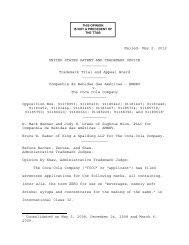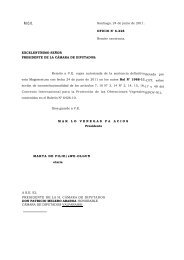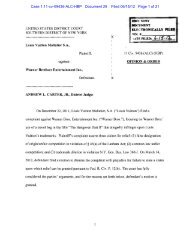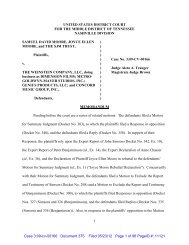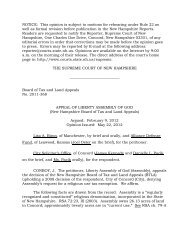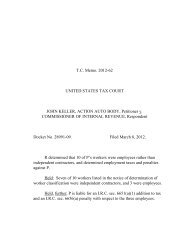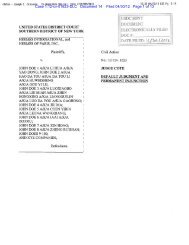Graham's Factree Pty Ltd v Oak Enterprises
Graham's Factree Pty Ltd v Oak Enterprises
Graham's Factree Pty Ltd v Oak Enterprises
Create successful ePaper yourself
Turn your PDF publications into a flip-book with our unique Google optimized e-Paper software.
- 3 -<br />
Research & Development <strong>Pty</strong> <strong>Ltd</strong> v Commonwealth [1997] FCA<br />
934);<br />
(ii) result in significant overlap between the evidence adduced on the<br />
hearing of the separate question and at trial — possibly involving the<br />
calling of the same witnesses at both stages of the hearing of the<br />
proceeding: GMB Research & Development <strong>Pty</strong> <strong>Ltd</strong> v<br />
Commonwealth; Arnold v Attorney-General (Vic) (unreported, Fed C<br />
of A, Sundberg J, Nos VG629–37 of 1995, 8 September 1995,<br />
BC9502745). This factor will be of particular significance if the<br />
court may be required to form a view as to the credibility of<br />
witnesses who may give evidence at both stages of the hearing of the<br />
proceeding; or<br />
(iii) prolong rather than shorten the litigation (GMB Research &<br />
Development <strong>Pty</strong> <strong>Ltd</strong> v Commonwealth).<br />
9 It was common ground that in intellectual property cases involving patents, trade<br />
marks or plant breeder’s rights, it is customary to hear and determine issues of liability prior<br />
to issues of pecuniary relief. As Kenny J recognised in Fleming’s Nurseries v Hannaford<br />
[2008] FCA 591 (“Fleming’s Nurseries”), this is principally because the need which would<br />
otherwise arise to lead evidence on both damages and an account of profits is avoided.<br />
Kenny J stated at [18]:<br />
It is customary in intellectual property cases, however, to hear and determine issues<br />
of liability separately and before issues of pecuniary relief. This is largely because it<br />
is generally thought just and convenient to so order on account of the fact that an<br />
applicant in such a case is not compelled to make an election as between damages<br />
and an account of profits at least before the evidence on liability has been received …<br />
Under s 56(3) of the PBRA, in an action for infringement, Canada is entitled to make<br />
an election for damages or an account of profits. That is, the nature of Canada’s<br />
case attracts the same considerations as other intellectual property cases requiring<br />
an election between the remedies in the event that liability is established. (emphasis<br />
added)<br />
10 In Reading, Branson J made a like acknowledgement at [9] where her Honour<br />
concluded:<br />
Ultimately the issue for the Court to determine when consideration is being given to<br />
the making of an order under O 29 r 2 is whether it is “just and convenient” for the<br />
order to be made (Arnold v Attorney-General for the State of Victoria). There are<br />
classes of proceedings in which it is commonly recognised that it is just and<br />
convenient for an order under O 29 r 2 to be made. One such class is proceedings<br />
concerning intellectual property rights where an applicant can not be compelled to<br />
make an election as between damages and an account of profits at least until all of<br />
the evidence has been received so that, if an order has not been made separating the<br />
determination of the issues of liability and relief, the parties will have to call<br />
evidence to deal with both damages and an account of profits (Dr Martens Australia<br />
<strong>Pty</strong> <strong>Ltd</strong> v Bata Shoe Company of Australia <strong>Pty</strong> <strong>Ltd</strong> (1997) 75 FCR 230)… (emphasis<br />
added)



